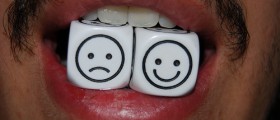
Chronic mild depression, also known as dysthymia, is a chronic mood disorder characterized by mild depression. This type of bad mood usually lasts much longer than major depression, but it is of less severity. This type of mild depression is often described as melancholy, or a bad state of mind. Mild chronic depression has fewer or less serious symptoms than major depression and in most of the cases, it is not even diagnosed. In many cases, patients and their close ones believe this depression is something that is just a part of their personality, and they fail to discuss the symptoms with doctors or other individuals that may help.
Signs and symptoms of chronic mild depression
Chronic mild depression is characterized by very unpleasant symptoms of hopelessness, general bad mood, increased irritability, and changes in the sleeping patterns. Depending on the individual state, patient may have problems with sleeping. Some of the patients will suffer from insomnia while the others may spend the whole day in bed, feeling constantly tired. In general, patient’s concentration is very bad, and they may have severe problems in making even the most irrelevant decisions. For this reason, the patient may have problems in everyday functioning at the office or in school. People with chronic mild depression may also have low energy levels and feel constantly fatigued. Their self-esteem is usually poor, as well as their sex drive. Unlike some other psychiatric conditions that involve mild depression, chronic mild depression (dysthymia) excludes any kind of manic, hypomanic or mixed episodes. If these symptoms are present, they could indicate a bipolar disorder, also known as the manic depression.
Diagnosis for chronic mild depressionAs already mentioned, people are rarely diagnosed with chronic mild depression, because both patients and individuals from their environment, tend to address these symptoms to features of the healthy personality. However, certain diagnostic criteria apply for chronic mild depression, and they include: depressed mood during a majority of days for two or more years, symptoms of depression that have never been absent for more than two consecutive months, the absence of manic, hypomanic, or mixed episodes, and presence of at least two of the characteristic and already mentioned symptoms. In addition, to be diagnosed with chronic mild depression, the patient should not have ever criteria for cyclothymic disorder, and doctors need to make sure the symptoms are not caused by medical illness, chronic psychosis or by certain substances. Moreover, the symptoms may cause serious distress or problems in various areas of patient’s engagement: work, school, family, etc.












-Signs,-Symptoms,-Treatment-And-Prevention_f_280x120.jpg)




Your thoughts on this
Loading...